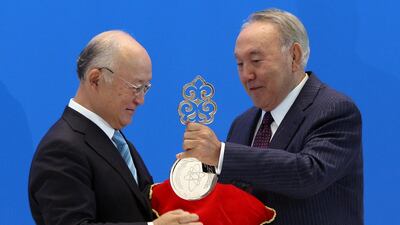The UAE has contributed $10 million to a 'uranium bank' that has been established to discourage new nations from enriching nuclear fuel themselves.
The International Atomic Energy Agency, the UN global nuclear watchdog, opened the $150 million bank in Kazakhstan on Tuesday.
The Low Enriched Uranium (LEU) Bank in the city of Oskemen, in eastern Kazakhstan, will store up to 90 tonnes of the fuel, enough to power a large city for three years, and sell it to IAEA members if they are unable to procure it elsewhere.
“The LEU Bank will serve as a last-resort mechanism to provide confidence to countries that they will be able to obtain LEU for the manufacture of fuel for nuclear power plants in the event of an unforeseen, non-commercial disruption to their supplies,” IAEA Director General Yukiya Amano said in a statement.
Countries such as Iran have said they need enrichment facilities to ensure a steady supply of fuel for nuclear power plants, and the idea behind the bank is to make such supply available without domestic enrichment.
Russia has operated a similar bank since 2010 but the one in Kazakhstan will be the first one fully owned and operated by the global nuclear watchdog.
“By hosting the IAEA LEU bank, Kazakhstan has made another contribution to strengthening the global non-proliferation regime,” Kazakh President Nursultan Nazarbayev said as he handed Amano a symbolical key to the facility at a ceremony in the Kazakh capital, Astana.
“I am confident that the IAEA LEU Bank will make a valuable contribution to international efforts to ensure the availability of fuel for nuclear power plants,” Amano said.
The IAEA said in a statement it would begin buying uranium soon, with the aim to ship it to the bank next year. The project was funded by donors, including the United States, the European Union, Kuwait, the UAE, Norway and the Nuclear Threat Initiative.

